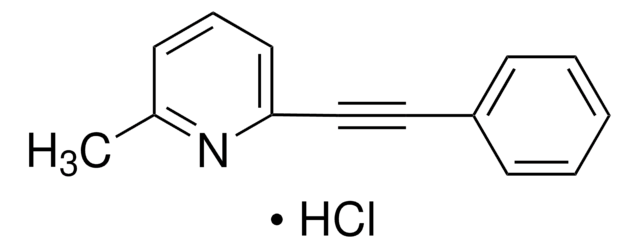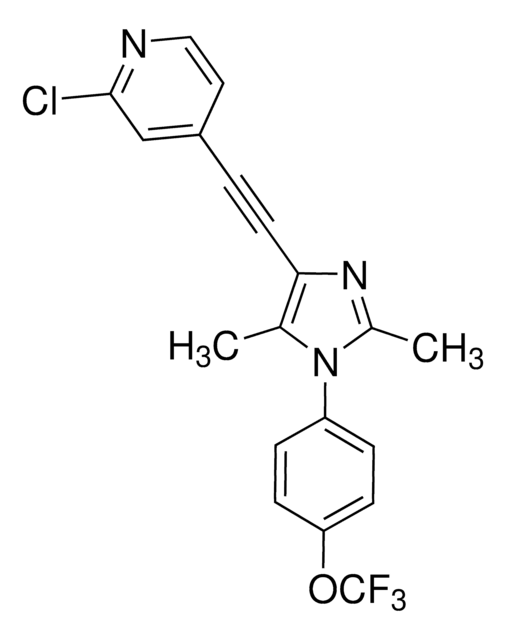445874
mGluR5 Antagonist, MTEP
The mGluR5 Antagonist, MTEP, also referenced under CAS 329205-68-7, controls the biological activity of mGluR5. This small molecule/inhibitor is primarily used for Neuroscience applications.
Synonym(e):
mGluR5 Antagonist, MTEP, 3-((2-Methyl-1,3-thiazol-4-yl)ethynyl)pyridine
About This Item
Empfohlene Produkte
Qualitätsniveau
Assay
≥98% (HPLC)
Form
solid
Hersteller/Markenname
Calbiochem®
Lagerbedingungen
OK to freeze
protect from light
Farbe
white to yellow
Löslichkeit
methanol: 1 mg/mL
DMSO: 5 mg/mL
Versandbedingung
ambient
Lagertemp.
2-8°C
InChI
1S/C11H8N2S/c1-9-13-11(8-14-9)5-4-10-3-2-6-12-7-10/h2-3,6-8H,1H3
InChIKey
NRBNGHCYDWUVLC-UHFFFAOYSA-N
Allgemeine Beschreibung
Biochem./physiol. Wirkung
mGluR5
Verpackung
Warnhinweis
Rekonstituierung
Sonstige Hinweise
Busse, C.S., et al. 2004. Neuropsychopharmacology29, 1971.
Roppe, J.R., et al. 2004. Bioorg. Med. Chem. Lett.14, 3993.
Klodzinska, A., et al. 2004. Neuropharmacology47, 342.
Cosford, N.D.P., et al. 2003. J. Med. Chem.46, 204.
Brodkin, J., et al. 2002. Eur. J. Neurosci.16, 2241.
Rechtliche Hinweise
Lagerklassenschlüssel
11 - Combustible Solids
WGK
WGK 1
Flammpunkt (°F)
Not applicable
Flammpunkt (°C)
Not applicable
Analysenzertifikate (COA)
Suchen Sie nach Analysenzertifikate (COA), indem Sie die Lot-/Chargennummer des Produkts eingeben. Lot- und Chargennummern sind auf dem Produktetikett hinter den Wörtern ‘Lot’ oder ‘Batch’ (Lot oder Charge) zu finden.
Besitzen Sie dieses Produkt bereits?
In der Dokumentenbibliothek finden Sie die Dokumentation zu den Produkten, die Sie kürzlich erworben haben.
Unser Team von Wissenschaftlern verfügt über Erfahrung in allen Forschungsbereichen einschließlich Life Science, Materialwissenschaften, chemischer Synthese, Chromatographie, Analytik und vielen mehr..
Setzen Sie sich mit dem technischen Dienst in Verbindung.








